Key takeaways:
- Community concerns about cannabis retail are deeply rooted in local perceptions, necessitating open dialogue to address fears and misconceptions.
- Engaging the community through forums, partnerships, and personal conversations is essential for building trust and fostering collaboration.
- Transparency and education play critical roles in alleviating community fears and dispelling stigma surrounding cannabis use.
- Continuous feedback mechanisms and utilizing social media can enhance ongoing dialogue and strengthen relationships with residents.
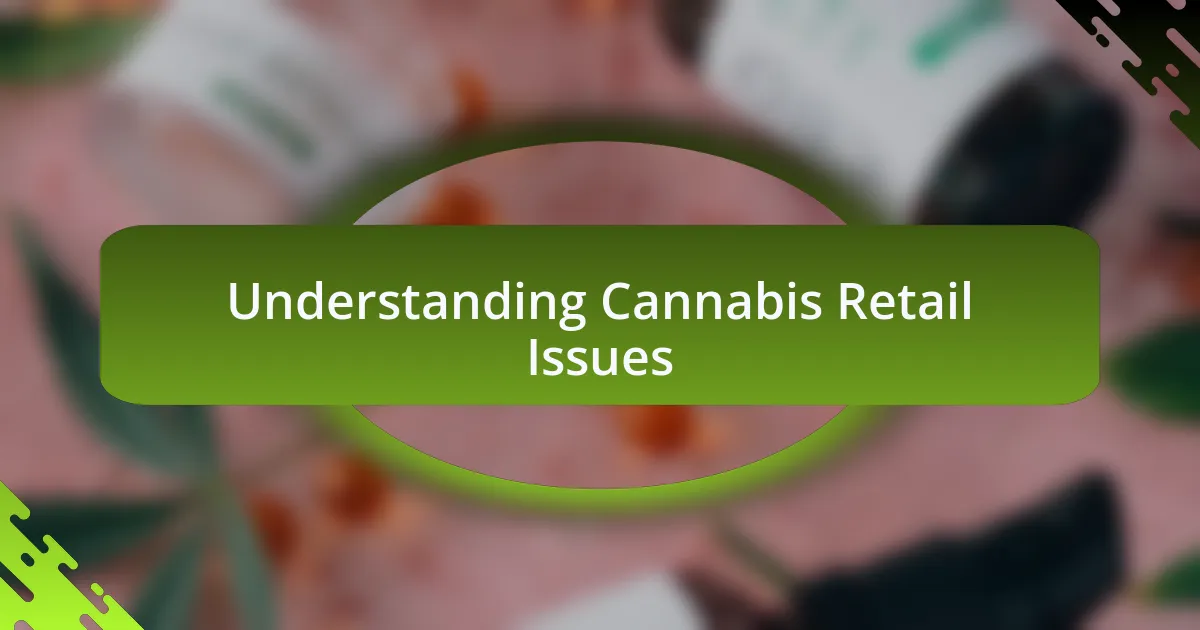
Understanding Cannabis Retail Issues
Cannabis retail issues are multifaceted, deeply rooted in community perceptions and regulations. I remember a time when I spoke with a local resident who expressed concerns about how a new dispensary might affect neighborhood safety. This conversation opened my eyes to the emotional weight these establishments carry, prompting me to consider: How can we bridge the gap between cannabis education and community fears?
Navigating the complexities of legality and compliance is another challenge that cannabis retailers face. When I attended a community meeting, it struck me how many attendees were unaware of the strict regulations that govern cannabis sales. These often-overlooked details can create a sense of mistrust, which can be puzzling—why should the community care if they aren’t informed about these measures that ensure safety?
Lastly, the stigma surrounding cannabis use still looms large in many areas. I recall a discussion with a small business owner who hesitated to support cannabis initiatives, fearing backlash from their customer base. It made me wonder—what steps can we take to foster a more open dialogue that dismantles these stigmas and promotes understanding within our communities?
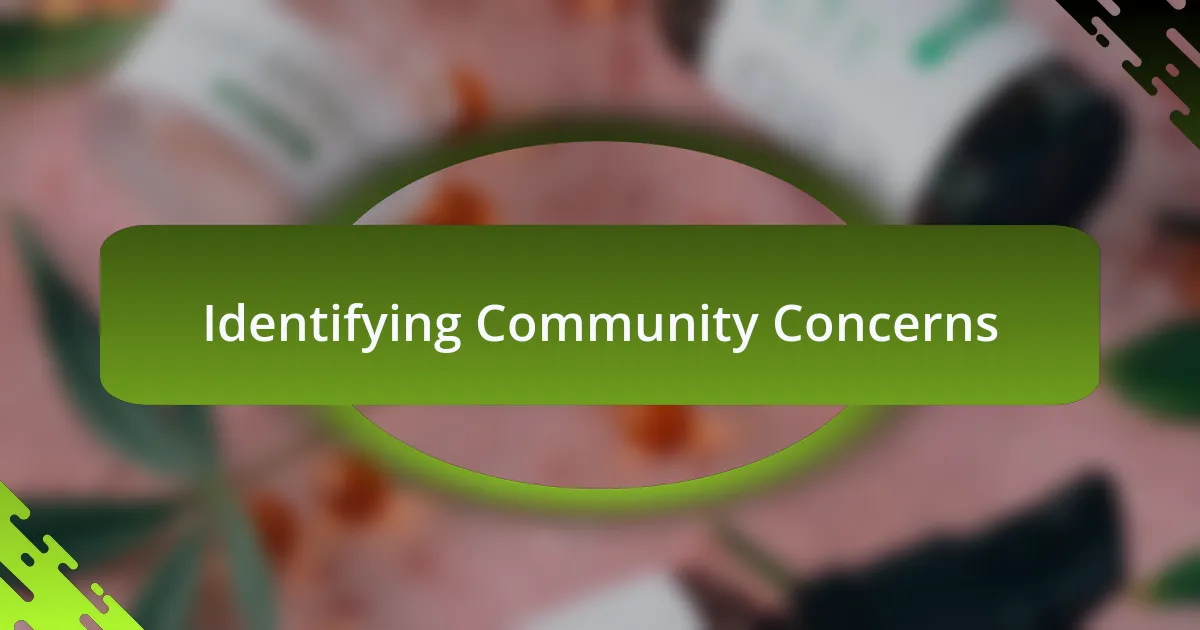
Identifying Community Concerns
Identifying community concerns starts with understanding the diverse perspectives within the neighborhood. During my outreach efforts, I encountered a senior citizen who voiced worries about increased traffic and noise near a proposed cannabis store. Her fears were palpable, revealing how deeply intertwined those concerns are with community identity and daily life.
The process of unearthing these issues often means going beyond surface-level discussions. At a local focus group, I found that many parents feared that cannabis access could lead to youth exposure and substance use. Reflecting on this, I wondered—how can we assure them that responsible retailing comes with education and safeguards that prioritize youth protection?
Listening to voices from different walks of life has shown me that each concern is not just a logistical issue but a reflection of personal experiences and values. For instance, one community member shared a heartbreaking story about a family member struggling with addiction, which shaped their view on cannabis. It made me realize just how essential it is to foster empathy and open dialogue around these concerns. How can we create spaces where everyone feels heard and respected? That, I believe, is the key to addressing community concerns effectively.
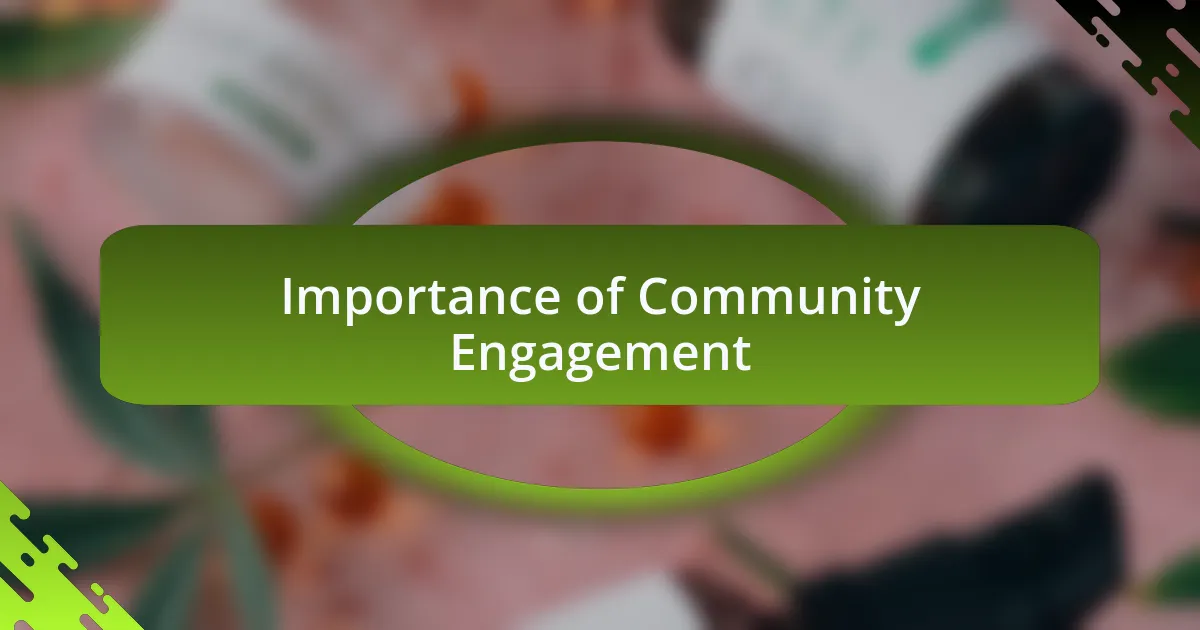
Importance of Community Engagement
Community engagement isn’t just beneficial; it’s essential for building trust and fostering relationships between cannabis retailers and residents. During a recent town hall meeting, I saw firsthand how openness cultivates understanding. A local business owner expressed concerns about the potential impact of a cannabis store on their family-run shop. By acknowledging these worries and incorporating feedback, we began to create a collaborative atmosphere that reassured everyone involved.
I’ve realized that community engagement is also about transparency and education. When I hosted an information session, a mother approached me, worried about how cannabis might affect her son’s health. It struck me that providing clear, accessible information can alleviate fears and misconceptions. How often do we assume that facts alone will make a difference? I believe it’s not just about what we present but how we present it. Building trust is a continuous dialogue.
Moreover, involving the community can lead to innovative solutions that benefit everyone. At another focus group, a participant suggested an initiative for youth education that would educate students about responsible cannabis use. This idea not only addressed concerns but also empowered community members to contribute positively. After all, isn’t it enriching when collective voices shape our neighborhood? Engaging with the community ensures that we’re not only responsive but also proactive in creating a safe and supportive environment for all.
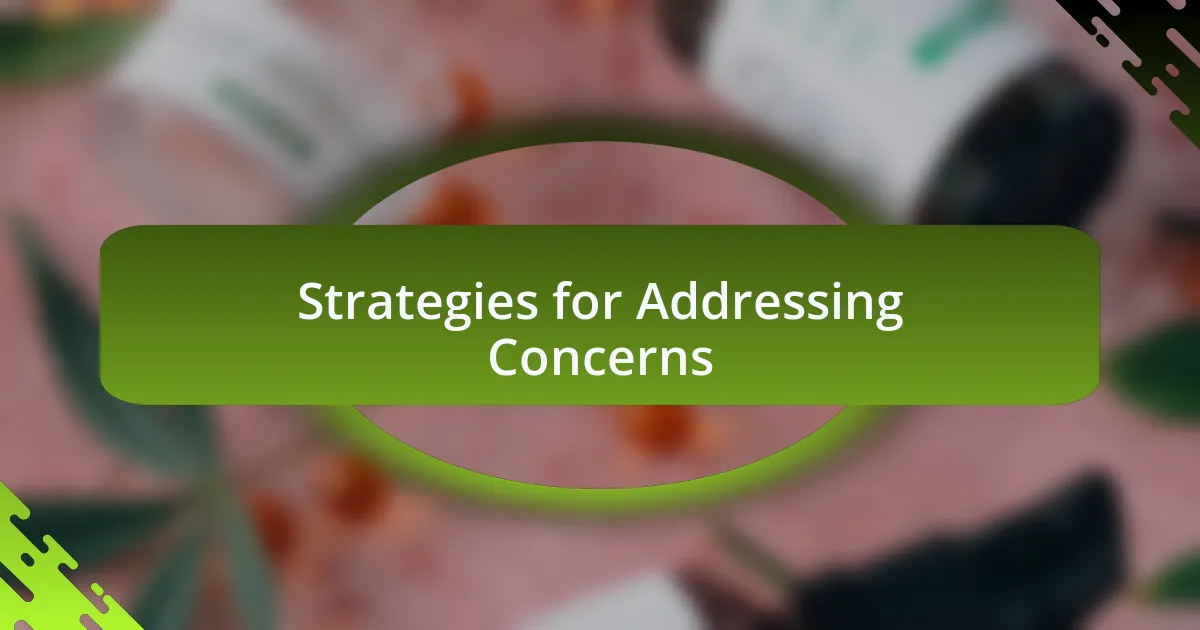
Strategies for Addressing Concerns
A crucial strategy I’ve employed is to hold regular community forums. During one such meeting, an elderly resident expressed deep concerns about cannabis-related odors in her neighborhood. I genuinely listened to her worries, and together, we brainstormed a plan for potential scent mitigation measures, showcasing that we value their comfort and input. Isn’t it amazing how open discussions can yield actionable steps?
Another effective approach has been fostering partnerships with local organizations. For instance, I collaborated with a youth mentorship program to create educational materials addressing cannabis use. This not only dispelled myths but also provided a platform for community youth to engage in constructive conversations. Through these partnerships, I’ve seen how shared goals can invigorate local trust and collaboration.
Lastly, I dedicate time to one-on-one conversations. While at a neighborhood block party, a resident approached me, genuinely concerned about how cannabis retail might alter the fabric of our community. I took her concerns seriously and shared personal insights into the ways we’re striving to foster a safe environment. By personalizing the conversation, I noticed a shift in her perspective. She left us feeling heard and informed, demonstrating that sometimes just lending an ear can be the most powerful strategy we have.
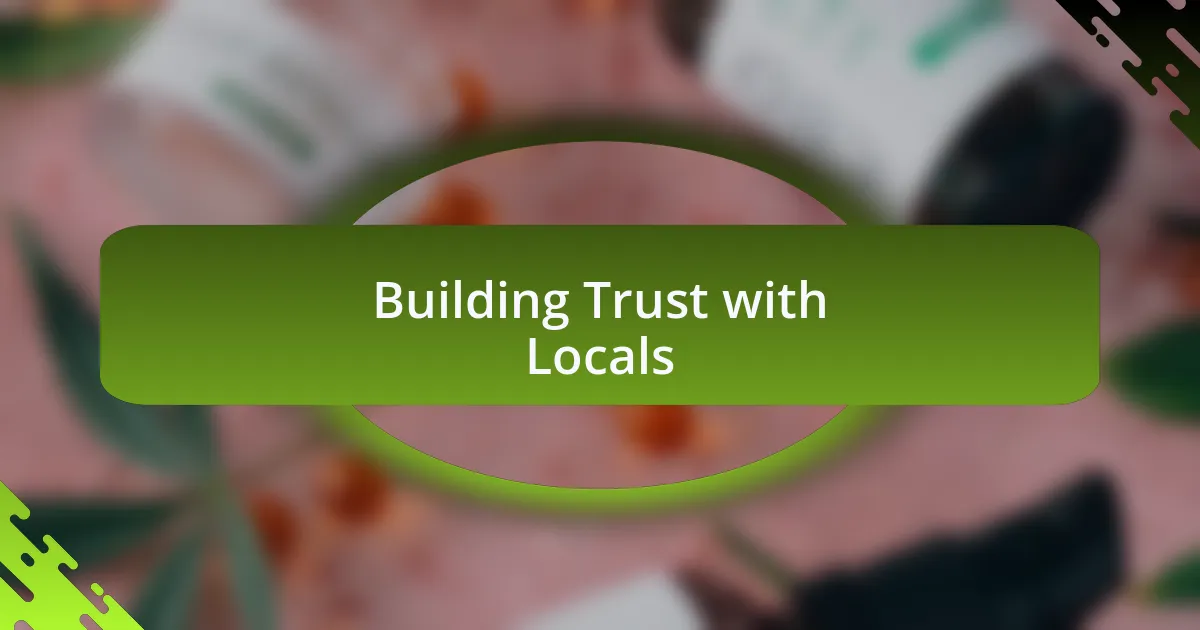
Building Trust with Locals
Building trust with locals requires finding common ground. I remember a Saturday morning at our local farmer’s market when I bumped into a group of moms discussing the stigma surrounding cannabis. Instead of just passing by, I joined the conversation, asking them about their concerns. Their apprehensions opened up a dialogue, and I realized that sharing my own experience of how cannabis can coexist with community values helped to soften their stance. Isn’t it powerful when common interests bridge gaps?
Engagement is key. One evening, I hosted a casual coffee session with residents. While sipping our brews, we talked about the positive impacts of responsible cannabis retail—like creating local jobs. One resident unexpectedly opened up about her son’s struggles with addiction, and it hit me hard. Addressing her fears in a supportive environment emphasized that I wasn’t just a business owner; I was a neighbor who genuinely cares. Those heartfelt conversations led to a stronger trust, as we recognized we’re all navigating this journey together.
Consistency in communication builds a lasting relationship. I remember sending out monthly newsletters not just about business updates but also sharing stories from community members who have benefited from cannabis access—whether it was about wellness or economic opportunities. I think engaging through storytelling humanizes the topic, encouraging local support while dismantling skepticism. How would you feel if your concerns were woven into the narrative? I’ve found that doing so fosters a sense of belonging, transforming potential adversaries into allies.
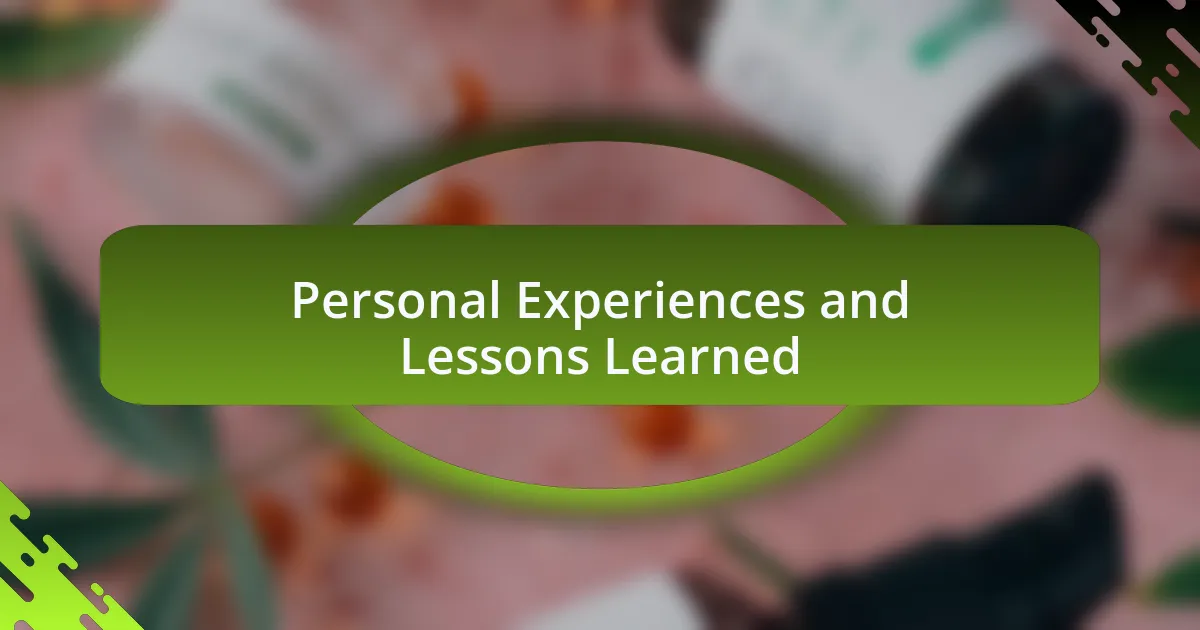
Personal Experiences and Lessons Learned
While attending a community health fair, I heard a father express worries about cannabis’ effect on young people. I took a moment to engage him directly, sharing how my team has taken strides to ensure strict age verification at our store. I emphasized that education is vital; by providing clear information about responsible use, I aimed to show him we’re all on the same side, invested in the well-being of the community.
In another experience, I was shocked when a local teacher approached me hesitantly after a town hall meeting. She shared her concerns regarding the perception of cannabis use among students. I listened intently and offered to collaborate on a workshop about cannabis education tailored for schools, which illuminated the path toward constructive partnership. It reminded me that, sometimes, transforming fears into actionable solutions starts with a simple conversation that demonstrates care and willingness to work together.
One lesson I’ve learned is the importance of vulnerability. During a community meeting, I didn’t shy away from discussing my own past misconceptions about cannabis. Sharing my growth in understanding made the discussion feel authentic and relatable. Have you ever noticed how openness can disarm tension? It reinforced the idea that we all have room to learn, reaffirming that addressing community concerns requires both dialogue and humility.
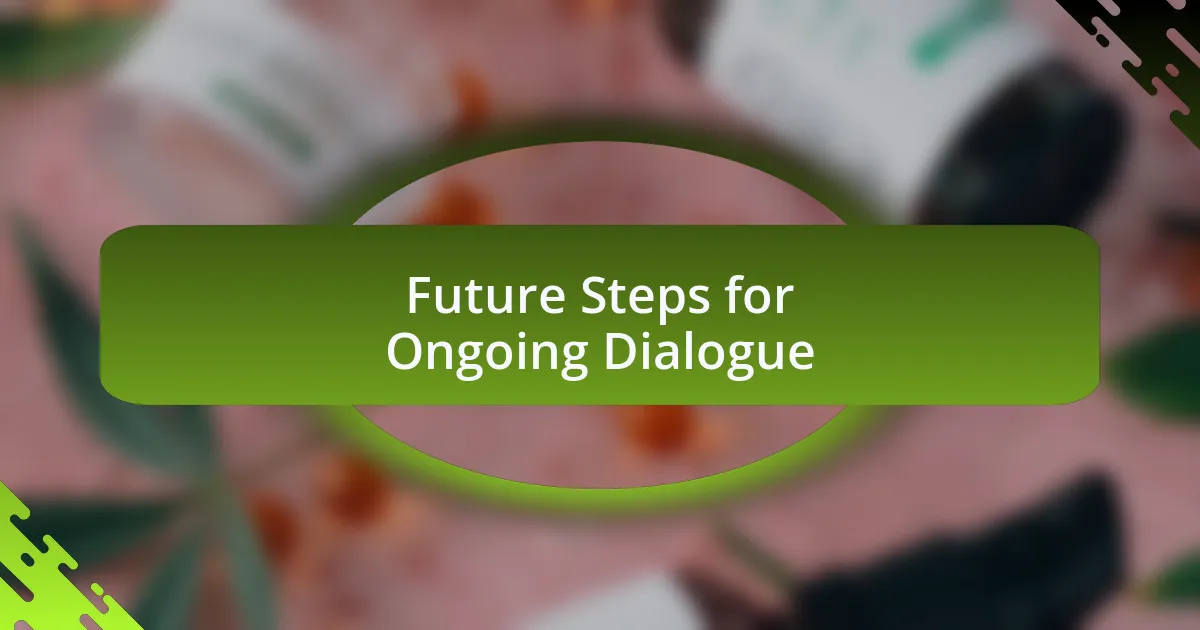
Future Steps for Ongoing Dialogue
Moving forward, I believe that establishing regular community forums is essential for fostering ongoing dialogue. By creating a space where community members can share their thoughts and concerns openly, we can help to alleviate fears and build trust. Imagine attending a monthly gathering where everyone feels heard—wouldn’t that contribute to a stronger sense of community?
In addition to forums, I see significant value in utilizing social media platforms for real-time engagement. People often have questions or concerns that come up unexpectedly. By actively responding and addressing these on digital platforms, we can demonstrate our commitment to transparency and education. Have you ever felt relieved when a business genuinely addresses your question online? That notion can drive positive relationships between cannabis retailers and the community.
Lastly, I think incorporating feedback mechanisms, like surveys or suggestion boxes in-store, is a practical step toward continuous improvement. This way, we create an atmosphere where community insights directly influence our practices. It’s empowering for residents to know their opinions matter—what if that slight change made them feel more connected to our mission? Continuing these conversations will strengthen our ties and promote understanding around responsible cannabis retail.